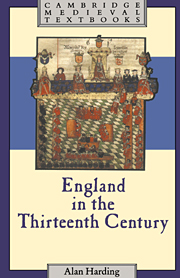Book contents
- Frontmatter
- Contents
- Preface and acknowledgements
- List of abbreviations
- Chronological table
- 1 Introduction: sources and interpretations
- 2 The peasants and the land
- 3 Traders and townsmen
- 4 Professional people
- 5 Knights
- 6 Magnates
- 7 Thirteenth-century politics
- Conclusion: the making of a state
- Guide to further reading
- Index
- Cambridge Medieval Textbooks
Conclusion: the making of a state
Published online by Cambridge University Press: 05 June 2012
- Frontmatter
- Contents
- Preface and acknowledgements
- List of abbreviations
- Chronological table
- 1 Introduction: sources and interpretations
- 2 The peasants and the land
- 3 Traders and townsmen
- 4 Professional people
- 5 Knights
- 6 Magnates
- 7 Thirteenth-century politics
- Conclusion: the making of a state
- Guide to further reading
- Index
- Cambridge Medieval Textbooks
Summary
How can the stories of the peasantry, the townsmen, the professional people and their lords be combined with a narrative of political events to produce a single story of ‘what happened in thirteenth-century England’? Tout's struggle between the barons and administrators and Hilton's ‘feudal crisis’ are possible frameworks for such a history, but they have no basis in contemporary ideas and cover only parts of the century's experience. Powicke's formation of a ‘community of the realm’ out of the communities of manors, gilds and shires does have a contemporary resonance, but leaves out too much of the spite and conflict. A concept which is both adequate to the thirteenth-century experience and based in contemporary ideas is ‘the making of a state’. The notion of the state takes its force from its ambivalence: it means at the same time the ordered community which is to be cherished and the coercive regime which enforces the order and easily comes to be feared and hated. Significantly, when the term comes into fairly regular use in the thirteenth century it is most often in the dual form: ‘the state of the king and the kingdom’ (status regis et regni). Social and governmental developments, and relations with other states can all be brought under the concept.
At all levels feudal relationships were giving way to legal status. At the end of the century, the kings of England, France and Scotland faced one another as heads of nation-states, though they still argued in feudal terms when it suited them.
- Type
- Chapter
- Information
- England in the Thirteenth Century , pp. 321 - 323Publisher: Cambridge University PressPrint publication year: 1993



